A project is under way that could lead to the establishment of Ireland's first air taxi service, with those working on it saying they are hoping to introduce it in 2027.
The Department of Transport has said it is supportive of work being done at the Future Mobility Campus Ireland where engineers and scientists from multiple agencies are looking at how drones can be used to transport people over urban areas.
The drones, known as urban air taxis, are currently being tested in multiple cities internationally and one service may even be in place in Paris for the Olympics this summer.
The EU’s aviation agency, EASA, has been planning for a future of urban air mobility for years, and in 2022 it proposed the world’s first set of rules for operating drone passenger services.
According to EASA, the electric passenger drones could follow specific flight corridors between locations.
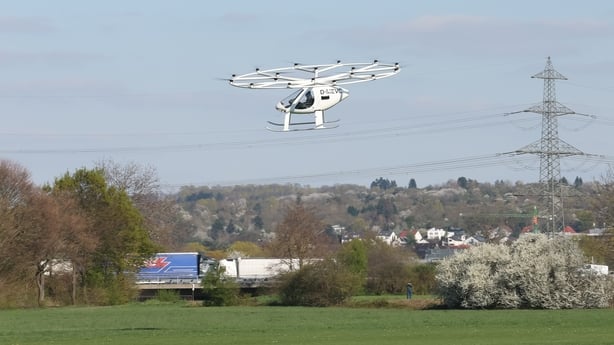
They would take off from 'vertiports’ (vertical take-off pads) which would be similar to taxi ranks.
A spokesperson for the Department of Transport said: "Urban air mobility (UAM) in Europe is still at the test and demonstration phase.
"Here in Ireland, national and international partners are carrying out innovative work at the Future Mobility Campus (FMCI) in Shannon.
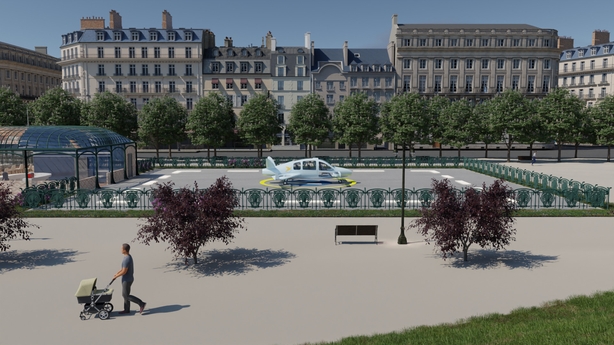
"The partnership is working towards launching an operational vertiport at Shannon’s FMCI campus thereby encouraging participation and investment in Ireland’s Innovative Air Mobility (IAM) industry.
"The long-term goal is the establishment of Ireland’s first air taxi service. The Department is supportive of the work being carried out at the FMCI campus."
It is expected that these services will be offered directly by manufacturers or small companies, while it is understood that some traditional airlines are also monitoring developments and looking at using the technology for city to airport transfers.
An appetite and a lot of interest from regulators
COO of the Future Mobility Ireland Campus Wassim Derguech told RTÉ’s This Week that 2027 was a "more realistic timeline" for the introduction of air taxis here.
Speaking from the Drone Summit in the RDS he said: "One of the projects that we are now doing a bit of research in and feasibility study in is about building a facility for air taxi services.
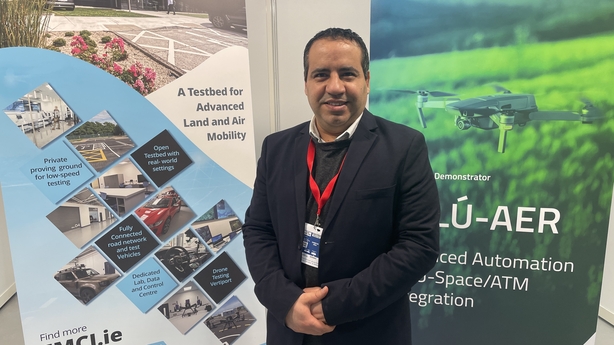
"There is an appetite and there is a lot of interest from regulators and air service providers to be involved in these projects because they want to know themselves and learn as soon as possible so they can put in the regulatory framework as soon as possible as well."
Mr Derguech said that the technology is already advanced enough for air taxis to run, and that the industry is well into its testing phase.
He said that regulations will need to be further developed to allow for them to take to the skies and run safely alongside other modes of aviation.
He also said that finding a way to make them affordable is another challenge that is being looked at.
"The intention is to make this massively produced. It’s not going to become a car, but at least it becomes affordable for people to take them and use them.
"But at the same time another challenge would be how we integrate those into different types of corridors.
"Now we are going to have civil aviation, we’re going to have emergency helicopters, we’re going to have air taxis, and we’re going to have hobbyists.
"How to create a safe space that integrates all of these together without stopping each other but also being away of each other and avoiding them safely."
The project in Shannon is not the only one.
CEO of Drone Space Ltd Ian Kiely previously conducted a study alongside the European Space Agency that looked at how a line could potentially be established between Dún Laoghaire and Howth in Dublin.
He said that passenger drones in cities are no longer a "blue sky thing".
"Last year we did a study with the European Space Agency in Dún Laoghaire, looking at Dún Laoghaire as a possible hub.
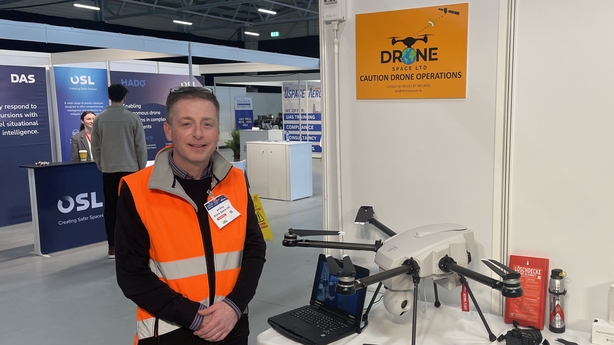
"In real terms you could connect Dún Laoghaire to Howth and it would only take six minutes to cross and you could remove a significant amount of traffic from the road.
"We reported them [the results of the study] to the Space Agency, and we’re waiting for the connecting technologies.
"We can fly from A to B now, but we can’t guarantee to keep that airspace ours and we would be flying under airplanes.
"So we are now working on solutions that would geofence using a satellite invisible barrier to keep the drone in the A to B zone.
"Then you’d be able to do A to B, A to C, D to X, so it is about when you want to start connecting them on a larger scale so we need to smooth that part of the technology."
Mr Kiely said the regulation and the technologies are there, but that it hasn’t been "fully mapped out" yet and that it is "not all in the one place".
Colm O’Donnell was an airline pilot for over 30 years.
Following his retirement he started UspaceAero, a company that offers drone training courses.
Mr O’Donnell believes that drones will only become more advanced, and that they will play a much stronger role in the aviation industry in the future.

"The whole aviation industry is only 100 years old, look where manned aviation has gone. Look at the last ten years with unmanned aircraft which is developing at a rapid rate, so much so that a drone was flown on Mars recently.
"When you’re looking at unmanned air mobility and carrying passengers, it’s going to start in the big cities in the world.
"It’s already being planned in London, Dubai, Paris, and in Singapore. Some of these big cities, they’re going to be the first to have this infrastructure in place and we’re going to see that pretty soon."
Louise Jupp of the South Africa-based Terreco Aviation also said the idea of a flying taxi is no longer a concept only seen in sci-fi films or cartoons like 'The Jetsons'.
"In terms of the reality of it, it is happening," she said.
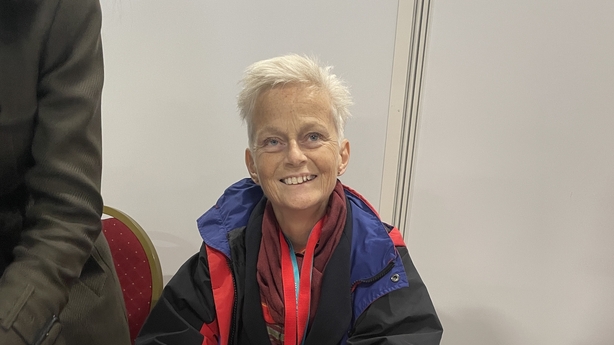
"How quickly it all becomes something that we don’t pay attention to, I don’t know, because it is so early that they are still developing the safety cases for these aircraft and ultimately operators are looking at these being pilotless."
Ms Jupp said that many industries are already being transformed by the use of drones, with medicine, farming, surveying, and freight all benefiting from them.
"It’s changing the way in which farmers can operate on site and manage the crops in particular or look after the animals.
"Farmers are saving time, saving money, and reducing the resources they’re using."
She said the data from drones is helping farmers react to any potential issues.
She also said there have been "amazing" results from a company called Zipline who have been using drones to deliver medical supplies in Ghana and Rwanda.
"Across all countries there are rural communities that don’t have as good connections and drone deliveries, and this changes people’s accessibility to services.
"The medical supply has been enormously important, and another area drones are also helping is in anti-poaching."
Dennis Collins works with the Shannon-based company A-techSYN, who manufacture their own drone.
The company’s main work is in surveying, but it is also involved in a medical delivery trial, and is working with the Irish military.
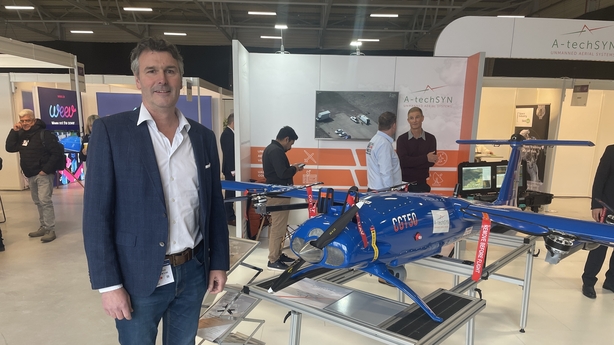
"We’re involved in research projects with the Defence Forces and especially the Irish Navy. We are involved in doing ecological surveys for offshore windfarms, and we are looking into future projects about transporting organs and blood to show proof of concept, so this can be used into the future."
He said there are huge environmental and cost benefits to using electric UAVs (unmanned ariel vehicles) over manned aviation.
Julie Garland of Avtrain, which provides training and certification for drone pilots and operators, also said the industry is growing fast.
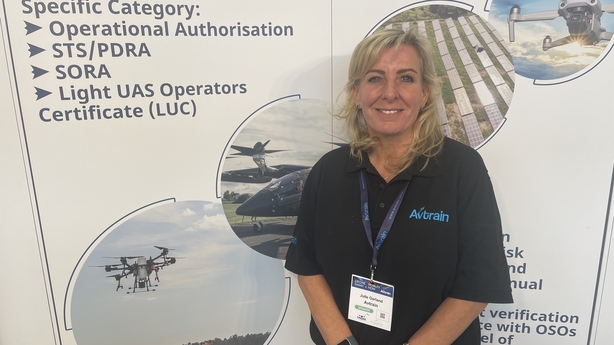
"Survey business is huge in Ireland, you’ve got roads, railways, flood plains, all of these need to be constantly monitored and drones are the ideal tool."
She said that councils are engaging with the technology, while Avtrain are also working with medical companies to look at using drones to deliver supplies.





